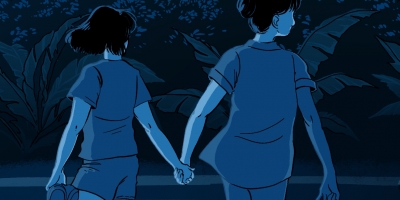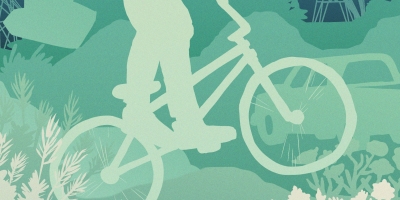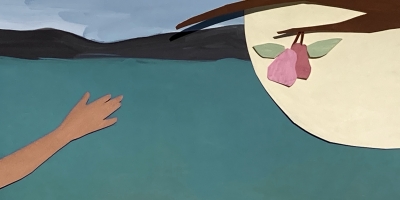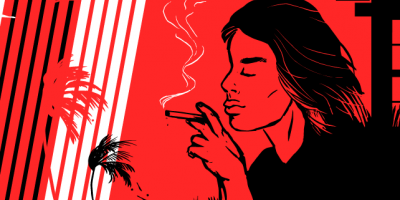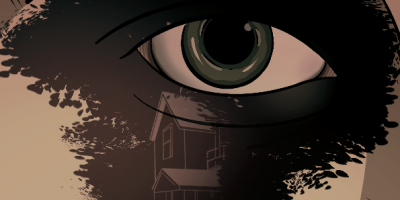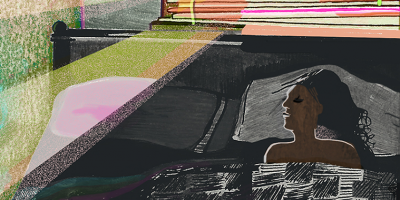Fiction
Santa Ana
by Katie Antonsson

3109 S. Manitoba Drive, Santa Ana
I drove out to Santa Ana, chasing the winds. When I got off the 405 the traffic lights were blinking red all down Fairview, and cars weren’t quite sure what to do at a five-lane, four-way stop. We all looked at each other through our windshields, sealed and isolated. Tentative false starts across the intersection met by a halting standstill, our headlights mingling in the middle of the road. I shook my head and nosed my way out, cautiously bold. The trees bucked and swayed and not a soul was out walking, nobody ever was. Orange County was miles of manicured trees and a distinct lack of signs of life.
The two things that punctuated our childhood were blackouts and the Santa Ana winds. God forbid they ever overlap, but often they did. The city took precautionary measures most years, flipping the switch when the winds got too strong, plunging us into a tense darkness where we kept our backs to the walls and held cool metal flashlights in our hands. Mom hid the knives, fed us dinner from cans, talked too much and didn’t let us speak in turn. But at least we could prepare, proverbially seal our lips when the phone rang with the automated call.
When the winds came, everything felt strained, like half the state was waiting for something to happen. It was like earthquake season, when the dogs go silent and the air feels heavy. When you look over your shoulder before getting in your car but you can’t quite say why. Just waiting.
That night, a fuse blew, plunging a full quarter of the county into darkness. The house was sealed—shutters latched, shades drawn, garage closed, the tether keeping it shut tucked firmly under the rubber skirt. Holding its breath, enduring the assault from without. I cut the ignition and stared at the front door, which at one point in my adolescence I decided never to see again. But Dad was gone. Anthony lived in Salt Lake City. I was the only available son, and I was stuck in an overpriced shoebox of a studio in El Porto, airplanes taking off and landing in my backyard, forty-five minutes on the 405 between me and my childhood home. I saw the door much more than I’d ever liked to. Don’t call it resentful, it doesn’t flatter me.
Mom wouldn’t have heard me drive up, not with the wind, so I sat in my car, taking a beat. Taking a sip from the flask in the glove compartment. I would have prayed, but it felt both treasonous and overdramatic: I hadn’t been to church since I was twelve, and seeing her was never that bad, was it?
I plunged out of my car before I could convince myself of a reason to start the engine and leave. The trees and hedges leaned west, the trash in the street twitching around, landing in the gutter, leaping into gardens and rose beds. The skies swept clean until they turned orange, because the fires were inevitable, it was only a question of where they’d exhale to life. I stepped on the cracked bricks of the walkway, confronted the front door. The wind blew through my jacket and swallowed me in a burst of heat that never failed to put me on edge. It galloped through my hair, grazing my scalp as I slid the key in, but the door didn’t open. I breathed a sigh of relief and took a step back toward my car, when one of the three locks slid open.
She kept the chain on when she peered through the door.
“You stopped picking up your phone,” she said as she let me in and refastened every bolt.
“I was driving.” The house was pitch black, the only illumination coming from a pocket flashlight on the kitchen counter, maybe the same one I’d gripped as a kid. It sent up a halo of glaring light, which dropped off sharply into shadow, the corners of the house obscure.
“You could’ve called at a red.”
“Not many lights on the 405.” I walked into the kitchen: the upended flashlight, a stack of months-old magazines, an open can of pineapple chunks with a fork sticking out of it sitting on the counter, the knives nowhere in sight. I flipped open the cabinet under the sink to find them tucked away, deeply unsettling, like even she didn’t trust herself not to snap in the dark. I certainly didn’t. “You could light candles, you know,” I said, kicking the cabinet closed.
She shook her head. “Earthquakes.”
“Plenty of Californians light candles.”
“And plenty of houses burn down every year,” she said, a perennial argument that I wasn’t sure had basis in fact. I didn’t argue.
Thirty seconds in the house was so exhausting—sent my nerves into overdrive, belched up memories I’d done my best to gloss over, assaulted me with smells that brought into sharp relief how close I still was to it all. I could have laid down on the floor and fallen asleep. “Where’s the genny.” She nodded toward the door to the garage. Dad’s old car was still there, half-hidden under a flaking tarp. She refused to let me or Anthony drive it, and she never drove it herself. It just rusted next to our old baseball gear and boxes of clothes we’d meant to take to the Goodwill. One of the tires was flat, the rubber slumped on the oil-stained ground.
I came back inside and shook the gas can demonstrably. “You don’t have any gas.”
“Why do I need gas?”
I tossed it back into the garage and closed the door. “To run the generator.”
She blinked so profoundly I could swear I heard it. “Well, go get some gas.”
“I’m not gonna go get some gas.”
“So you drove all this way just to leave me in the dark?”
“The lights will turn back on, they always do.”
“And what am I supposed to do until then?”
I threw up my hands. “I don’t fucking know, Ma.”
She watched me for a long moment, eyes sharp, the glare of the flashlight cutting shadows across her face. “Why did you have to come back,” she said, her voice even, tempered. “Why couldn’t it have been Anthony.”
Conversely, I wondered, as I often did, why it was Dad who had to die. I was never equipped to stage manage her, he was the only one who ever could, with his extraordinary patience. I’d never inherited that. I was a constant flight risk that paid off at sixteen, crashed back at twenty-four. She wanted her preferred son, I wanted my father, but both of us were grounded in this grim obligation.
Her face crumpled a moment later and she poked the fork repeatedly at whatever was left in the pineapple can, swimming in sucrose. “I used to put Tabasco sauce on your tongues when you and your brother were bad. Remember?”
“Hard to forget.” I didn’t know why she was bringing this up.
She flexed her jaw. “It’s illegal now. Mothers go to jail for that now.”
I wasn’t sure that was true either.
With catlike urgency, she ripped open a cabinet and slammed a can of beans down, cranking it open and dropping a fork in, sliding it across the counter toward me. She popped open the fridge, only momentarily so as not to lose the remaining chill, and pulled out a bottle of Tabasco, the label so decrepit it might have been the same punitive one from childhood. She slid it over and didn’t meet my gaze. I wasn’t sure if it was supposed to be a joke or not. Either way, it wasn’t terribly funny.
I did laugh, though. I think she took this as a loosening until I shook my head and said, “Why do I even bother.” I found it within me to march to the front door, to turn open the deadbolt, slide the chain off, flip the latch hook, and rip it open. The wind burst in, slamming the door against the wall and nearly knocking me in the face.
“No!” she yelled, rushing out of the kitchen. “God damn it, Ben, you can’t leave me in the dark!”
I stormed outside and turned to look at her, braced in the doorway, the wind lifting her hair, the pitch of the blackout settling between us like a curtain, and I could only barely see the whites of her eyes, searing and disappointed. I could pull the plug and simply stop caring, stop driving down the 405 at a moment’s notice like this time would be different. God knows I’d tried, but there was heady intoxication in reaching for the hand that had only ever sliced you, like maybe it would be different. It never was. I should know better by now.
I thought maybe she was about to say something, capitulate, complain, need my help in such a way that I could say no, never again, relish the panic on her face. But before she could take a breath to speak, a fierce buzz and hum filled the neighborhood as the streetlights shimmered back to life and the house lit up like a beacon behind her.
Everything flipped, the wind pulling the breath from my body, the light clarifying her disdain. She turned and trudged back into the kitchen and scooped the can of pineapple from the counter, tossing the flashlight into the drawer and closing it with a snap. She left the door open.
1460 Allison Avenue, Echo Park
The day was long and the heat wouldn’t give up. The wind rattled through the street as Mari watched the man leave, not quite sliding out of the picture like all those before him, but reaching back to shatter the frame altogether. The shivering fear of what wafted out of the house behind her was propulsive; she wanted to vault down the stairs and lay down behind the car as he backed out, catch him off guard, get run over. It would solve everything.
Her hair blew in her face, strands caught in beads of sweat. She dragged it out of her eyes, staring down at the car door opening, the body getting inside, the car door closing. If he knew she was watching, he gave no indication. It was the lack that did it for her, the bruising apathy, while she stood in the wreckage. How easy it was for him to pull out into the street and drive away. It all came to her slowly. The shrubs shuddered and she could hardly hear anything as he disappeared without fanfare, the wind swallowing him whole, ferrying him on. His car jerking at the stop sign at the end of the street, brake lights flaring, then creaking across the intersection.
She sunk down, her feet pointing toward each other, the wind passing straight through her. Her face crumpled and she thrust the muscles apart, smooth as glass. See how few wrinkles? her mother said in the vanity one day, stretching the skin of her cheek back. Only laugh lines. Don’t let them count the frowns on your skin when you’re dead. At the wake, cousins and neighbors and childhood friends thought she was leaning over the casket, whispering final words, but Mari was counting the frowns, scrutinizing the skin caked in makeup.
Now she wiped her forehead, flicking the sweat off her fingers. The street was quiet—it had been all week. She was desperate for someone to cry out, for someone to laugh, for two people to pass by deep in animated conversation, impervious to the wind. But she knew as well as anyone that the women on the block were also standing quietly at the door, at the window, behind the sink, looking out at the empty street. The winds animated men, but they paralyzed women. Girls waiting by the phone, boys getting high. Old arguments ignited, new lusts extinguished. Fists thrown, shouts muffled. Runaways bound for the desert and grandfathers squinting until the sun turned red.
Finally, a car backfired down the block, a ring of laughter split apart. So there was still a world out there, orbiting slowly.
With a heaving grief, a fresh kind of failure, she headed back inside the house, where it was none the cooler. Fans blew hot air around the living room, around the diminutive kitchen, where something was burning in the oven. An optimistic Sunday dinner, crisped to charcoal. She wrapped a dishtowel around her hand and pulled the pan out, oozing and amber, and threw it in the sink, the first clatter of noise she’d made. Beyond caring about the damage to her mother’s kitchen fixtures.
Mari looked out at the neighbor’s home, at the cool couple lounging on their couches in an oasis of air conditioning, all bare legs and unbuttoned shirts. A fly landed on the glass, rubbing its arms together, and Mari thwacked the rag against the window, killing it dead. It fell to the windowsill, legs in the air, motionless. She brushed it into the sink and ran the faucet, the water hissing against the scalding pan, the steam exhaling into the suffocating kitchen. She rested her forehead against the glass, the panes the coolest thing by a degree or two.
Cruelly, unfathomably, she pictured a life without Yvonne. If she’d claimed miscarriage and gotten the abortion, her mother’s house on Allison Avenue to herself. The parties she’d throw and the men she’d meet—of a different caliber altogether. Stepping outside to smoke a joint and walk around the lake. The way she’d wake in the morning, lazy and relaxed in the clear light, to find the house empty and easy. The freedom to come and go, the freedom never to explain, never to apologize. Bare legs and unbuttoned shirts, enough money to lug an air conditioning unit at least into the bedroom window, fastened in place by the young men next door. Never needing to worry, not like this.
There was only the span of sisters, of cousins between Mari and Yvonne. Not the span of mothers and daughters. In truth, Mari had to admit with a sick lurch of the stomach, it was a shock it hadn’t happened before, given the way she caught her boyfriends looking at Yvonne. Given how hard she worked to swallow those glances, obliterate them, feign ignorance. It was only ever looking.
The quiet screech of Yvonne’s door was a dead giveaway, since she kept it shut with a degree of teenage melodrama always. Mari had stepped away for just a second, leaving the man in her bedroom while she checked on dinner, and Yvonne’s door creaked open, the dry air crackling against Mari’s skin, her ears trained to the hallway. The fans devoured the smaller sounds, the wind outside ate them whole. Mari breathed quietly, a shivering premonition she couldn’t bear to admit to, much less look in the eye. But she dared, stepping into the hallway, the sliver of light coming from Yvonne’s door where usually it was a black hole. At the first whisper of a deeply human sound, she pressed the door open. His back, broad and overpowering, his face against her neck. Yvonne pinned against the wall like a butterfly, young, bright, and petrified.
Mari hadn’t even screamed, as her mother would have done. She hadn’t said a word, merely stood there with wide, uncomprehending eyes until he hitched up his pants and blazed past her, out the door, to the car. She followed, in a state of unreality. Her daughter slammed the door from deep in the house. Her mother’s inscrutable ghost hovered over the proceedings, witnessing archly.
Mari lifted her head and wiped the grease off the windowpane. The patches of foggy sweat grew heavy and slid in small drops down the glass. She stepped into the hallway, but Yvonne’s door was still shut firm. What was there to even say? She still felt too young to know, yearned for her mother’s caustic guidance. But that patronizing wisdom was gone, dead and tucked behind a face etched with frown lines.
She knocked lightly. There was no response, but that wasn’t unusual. She placed a tentative hand on the doorknob, where it sent off a spark so sharp Mari took a step back. She leaned back against the wall, her voice shredded as she called, “Yvonne?”
No response. Not unusual.
Not long ago, all of this had been reversed. It had been Mari locked away in the room, her mother hovering outside in the hallway, preparing the lecture on responsibility while Mari heaved into the wastebasket, sixteen and terrified. She’d needed kindness then, a reason to live fully, received neither, delivered a daughter and years of spite. Maybe her mother hadn’t known what to say back then either, had looked at Mari the same way Mari looked at Yvonne, like an unfamiliar object, hardly like kin. Loath to let history repeat, Mari pressed open the door.
Yvonne was slumped on her bed and Mari stood frozen in the doorway for a moment, wildly uncertain of the next step. Her mother hadn’t touched her that day, so Mari came inside, put her hand on Yvonne’s shoulder, but Yvonne didn’t wake. Mari shook her and the girl remained leaden, though her hand slipped away from beneath the pillow and hung limp over the beige wall-to-wall carpeting, the wound across her wrist dripping slowly.
1166 Magnolia Avenue, Manhattan Beach
Cate relished the drive through the city to the beach. The stretch of the 110 was hairy through downtown, but the excitement of the buildings stretching up as she came down the 101 to the southbound on-ramp never got old. The traffic slowed, and her foot danced between brake and gas as the red lights down the lanes flashed on and off, inching forward. There was a marked difference on the freeways during Santa Ana season: eagerly blaring horns where usually there was a shred of patience, lane-weavers, two cop cars for a speeder where one usually sufficed. Leather seats were sticky beneath shorts, and fingers left traces of sweat on the steering wheel. The radio DJs talked of the heat and the hits. The Beatles may have broken up, but they’re still together on 100.3 The Sound.
Nobody expected the winds to descend so soon, without mercy, and boarding a plane to start school in Chicago sounded more appealing to Cate with every passing day. She zipped down the 105 and glanced at LAX gleaming in the brilliant sunset, the purple of the illuminated pillars at odds with the fiery sky. L, A, and X glowing softly in white block letters couched between the palm fronds and the freeway off-ramp. Cate ran her fingers through her hair and wiped the sweat on her shirt. Her windows were down—the AC had been broken all summer—and she sat in a growing pool of her sweat, the winds blowing right through her car like a presence, cracking open the sacred, inviolate solitude of driving in Los Angeles.
Her ears were ringing in a riot of noise when she pulled up to Victor’s house. Juicing the last drops out of summer, before either of them flew to their disparate schools and the misery of winter that settled too swiftly. All summer there had been long drives together across the city, bottles of pilfered wine in backyards, bonfires cracking in the violet hour, subtle brushes of skin on the beach, but never anything full-throated. The anxiety of innocence, the way it paralyzed her when the implication was plain—that tonight was the last chance, the only chance.
He was in the backyard, his dog’s bark resounding in the street as Cate crossed, the wind blasting her hair out of her face, and opened the gate.
“Oh, motherfucker,” Victor spat as the ball went sailing over the brick wall. The dog looked around the yard stupidly, tail at a standstill. “That was the last one,” he sighed, pressing the bat into the grass.
“I can go get it,” Cate offered.
He chewed on his lip. “Nah.” He turned his attention to the dog, still sniffing plaintively in the air, and laughed. “Poor Sally. Come here, girl!” The dog bounded across the yard, saliva dangling from her mouth in viscous threads, and into his lap.
A burst of heat shot through the yard and Cate pulled her sweat-soaked shirt away from her chest, peeled her hair out of her eyes. Everything clung to her in Santa Ana season, grasped her bare skin and left hot signatures behind, kinked her hair and made it heavy, plastered to her neck, her cheeks. She didn’t know what the fuck they were waiting for. What were they doing in the backyard, with the pretense of the dog keeping him occupied, distracted? Was this truly how the last hours of summer were to be spent, standing at a distance?
“Who lives over there?” she asked.
Victor looked up at the wall while Sally pressed her brown head into his stomach. He thrust back a hand to catch his balance and said, “Some couple. Moved in last summer.” Sally barked and pressed a muddy paw to his knee. He threw up his hands, waiting for more coherent conversation from the dog.
Because something needed to happen, Cate tramped across the yard, pulling her hair off of her neck, but it just flopped back against her, wet and heavy. She hopped up on a rock in the corner of the yard and pulled herself on top of the wall, the rough edges scraping her bare knees.
“Cate, it’s cool,” Victor said, getting to his feet. “Don’t go over there, they don’t like us very much.”
She gave him a wry smile and swung her legs over, dropping down into the bare grassy yard next door, every blade set ablaze in the oceanside sunset. The house was calm and dark, just the rattle of the air conditioning betraying any sign of life, but Cate still held her breath as her body hummed with the breach, minor as it was. Two neon tennis balls were nestled in the overgrown grass, and she tossed one back over the wall, exercising a degree of frustration. Sally barked joyfully. Cate turned back to get the second and stopped cold.
In the window facing the yard, a woman was pressed to the glass, her bare ass pancaked and wet. Her back arched, her shoulder blades flexing against the glass as she inhaled, exhaled heavily, leaving subtle and fast-evaporating curves of sweat. A man came up to her and kissed her neck, one arm sliding around her waist and the other tangling up with her own, bent back against the window. His fingers dug in and dented her skin, like he might burst through and squeeze out her flesh, ripe and glistening. He glanced up and caught Cate’s eye, unflinching. He smirked and pressed himself deeper into the woman, not looking away from Cate.
There was a raw lack as the winds settled, a sudden stillness and silence that came like a roar. The grass stopped burning orange beneath her bare feet. The soil oozed sweat between her toes. The sky suspended above her as if at any moment the strings would snap and send it crashing down. And two pulsing eyes that reached for her. Cate was slick with sweat, a single drop beading and trickling slowly down her leg into the freshly bleeding scrape on her knee. The blood itself fattening and sliding down her shin, leaving a shining crimson trail in its wake. The man placed a hand on the glass and devoured Cate from afar, pulsed, opened wide and howled.
The wind burst into the yard and the bushes rattled, the grass blazed, and the world accelerated. She dropped the tennis ball and rushed back to the brick wall, heaving herself over, legs flying, and tumbled back down into Victor’s backyard. The fall was a shock and for just a moment she couldn’t breathe.
Cate got to her feet and Sally came to her, barking, tongue flying. Victor rested the bat on his shoulder.
“I thought I hit, like, three over there.”
The air clung to her skin as she inhaled, catching her balance, her voice chilled as she said, “Sorry. Your neighbors were fucking in the window.” His eyes still gripping and humid, curling over the wall.
Victor snorted, about to crack wise, but his face fell moments later. “You’re bleeding.”
She looked down at herself, her knees burnished and slick, the skin scraped away. She pulled her hair back in a ponytail, peeling the strands away from her skin, pressing her fingers into the back of her neck, denting the muscles. She licked her palm, salty with sweat, and smeared the blood across her shin.
508 S. New Hampshire Ave, Koreatown
Lewis was never the type to leave the house shirtless. He didn’t like the vulnerability of it, nor the look of it. But the wind smacked him as soon as his fingers slid from the front door and he wished he was the type. He was already sweating, his body consumed with fever, one he’d prayed would break overnight but which lingered like an uninvited guest. The heat filled the hollows of his nose and the familiar cavities of his skull swelled. He winced at the street lamps flickering on in the early dusk. He marched on, feet wet and sliding in his shoes.
This wasn’t going to end well, but nobody was around to remind him of that.
He coughed.
Neighbors were out smoking on the curb, cars idling at the corner, everyone suspiciously still. A crash from an open window across the street and Lewis flinched, his stomach churning, his spine shivering. He coughed into his fist, spat out the phlegm, and focused on pacing forward, his vision already pinched and uncertain, his mind slow and stupid, everything coming in laconic fits. A car engine revved at the stop sign and took off down 5th Street, tires screeching, the smell of scorched rubber filling the air, inflated on the wind. He spat out a burped mouthful of stomach acid.
He could hardly grapple with the options swarming before him, bright and colorful, crying out for attention. The fluorescents buzzed angrily above him and the molded stench inside the pharmacy on Vermont and 6th made him gag. He snorted back the phlegm and reached for the bottle with the vaguely familiar label. A yellow triangle on the back portended the fine print, which it was admittedly too late to read. He always found the earnestness touching, naïve, though he had to listen this time. Play fair. Play nice.
The cashier eyed him warily, the pale, hacking young man drenched in sweat, in saturated clothes hanging heavily from his slight frame. Lewis slapped a twenty down, took the bottle by the neck, and walked out, his damp hand leaving a slick bacterial imprint on the counter. The door closed pneumatically behind him.
He hacked and squeezed off the safety cap, trudging back up the filthy sidewalk of Vermont, past arguing winos and Korean grandmothers hauling shopping trolleys bursting with plastic bags. He pressed the bottle to his lips and tried to swallow only what he guessed was more or less the recommended dose, no more no less, not this time. With the signature sinus-gagging glide of dextromethorphan, it hit his stomach and he lurched toward a street lamp, pressing a heavy, wet hand against it, and waited for the retching to begin. It didn’t. He summoned the phlegm from the back of his throat and spat, coughing again, his chest raw, throat lacerated.
The wind rattled the street banners, the sickly palm trees, raging up behind him and battering the back of his head. Sweat dripped in creeks down his neck, and he closed his eyes as he passed the car wash, wishing he could walk through it himself. Scrub the outside, scrub the inside. Without much thinking, he choked back another mouthful. And another for good measure. He’d drop the bottle in the next garbage can he found, he promised.
Vermont roaring beside him, cars hurtling north careening south at forty miles per hour. Forty-five. Fifty. A cop car raging to action, sirens blaring and lights gyrating.
The corner on 5th.
His heart pounded in his chest, in his head, in his fingertips. The hand clutching the bottle throbbed with blood. The house was just there, but the gate didn’t bow out like that, had never gone quite so—convex like that.
He flicked off the cap again and let it roll into the street. A car drove by, wheel rolling over the cap, where it popped and shattered, a burst of white plastic in the middle of the road. The evening slid through him. The wind taunted beside him, laughed behind him, smashed into the back of his head again and ran away howling with mirth.
He fell against the front door as heavy, bloated fingers fumbled for the keys. They slipped his grip and jangled to the stoop.
The gate had never—
He ignored that as he filled his mouth again and swallowed hard, wiping his chin and licking the back of his hand with a red-stained tongue. Lewis. The keys were splayed on the brick. He leaned down with considerable strain, the journey taking days. An inch. An inch. His fingers slipped but his other hand caught the fall, the bottle sloshing, coating his knuckles. He hooked the keys with his pinky and stumbled back, on the precipice of losing his balance over the railing and into the hibiscus bush.
“Lewis.”
He looked up, across the courtyard, at his neighbor halfway through a cigarette on his front step, the man’s face a waxen crease of frown lines. The dull smoke drifted over on the wind.
“Lewis, you good?”
Lewis waved a hand as he slid the key into the bashed-up lock. “Fine.”
“What’ve you got there?”
He turned to Ric, his vision glitching. Another neighbor’s face swam into a window, eyes critical and biting through the glass. Thick drops of medicine sliding off of his fingers, splattering on the concrete step. A small, faint part of Lewis that understood exactly how this looked. “I’ve got the fucking flu, alright?”
“Is Jaki with you?”
Her name like a dart. Lewis scoffed, popping the door open with his hip. “Not for weeks.” The street was empty and still, the wind dancing alone down the blacktop. The world passed by in fits and starts.
He slammed the door behind him, a picture rattling off the nail and crashing to the floor, glass cracking. He collapsed on the couch, bottle aloft, and finished the last drop, fighting the urge, the need to vomit. It slipped out of his hand, a hot sticky trail across his chin, his chest, as it clattered to the ground. His fingers weren’t listening.
the ceiling had never—
he couldnt hear the wind.the fan was on.
his fingers hadnever—
A knocking against his skull. A pounding against his ribs. Woke him from minor unconsciousness. A key sliding into the lock, the door jumping back as the wind and Jaki burst in, blurry at the edges, her hair blown across her face. The verges of the world shivering, everything pinholed and gauzy. His name out of her mouth like a river, unfurling and cooling, sliding down his cheek.
On her knees beside him, her fingers clenched around his arm, gripping the last threads of him, as the phone shook in her hand, the subtle telephonic beeps. He tried to hold on as each fiber began to snap.
She smelled like jasmine. Like childhood walks in quaint suburbs, where the red brick of a neighbor’s walls held on to the day’s heat in the cooling evening. Fingers trailing against the grit, soaking in the warm, brushing over the clawed roots of ivy vines. Coyotes loping into the street and leaping deep into the bushes. The moon rising in a pink sky. Jasmine petals unfurling in the dusk and reeking, loose and libidinal.
Her voice. Telephonic. The room closing in, dense and hot and wet.
“They’ll never make it in time,” he said, choked and penitent, the sound lost on the wind.
Somewhere in Angeles National Forest
She struck the match.
Busy had never been much of a smoker, but she needed something in the maybe five, ten minutes she had left. There was a pack in the glove compartment of the truck, probably from some long-forgotten night down in Twentynine Palms drinking with off-duty Joshua Tree rangers. The stories they could tell. Do you know how many people have died out there? More than zero. The Martian desert wasteland fucked with even the soundest of minds. Her land was similarly violated, with the same teenage dares and misguided adult ventures. Do you know how many people stumbled out of the woods and upon her cabin, dehydrated and lost, inches from losing hope and succumbing? More than zero.
She cupped the flame in her hands and brought it to the tip of the probably stale cigarette, not quite able to hold either still. She breathed in enough clean air in the mountains, even if it was the wind from over the other side, dragged up from the desert. It sucked all the moisture out of the air, more than usual, and her skin and hair crackled with electricity. She had to rig up humidifiers in the greenhouse just to keep the young crop alive, but then of course the power overloaded and she was left without lights, without humidity, with heat a degree too high.
She’d tramped over to the fuse box and forced the switch. Nothing. Her cabin, the greenhouse at the edge of the clearing, remained dark, dry, still, the wind whipping every tree, shrub, and blade of brush around. It wasn’t just her, then. That meant the sheriff was on his way, then. To check in. Assuming it was an innocent call about a fuse box, unaware it was a mountain town jackpot. Bust her for operating illegally, play the hometown hero in the roadhouse while her mugshot made the rounds. She’d been expert at keeping him off her land, diverting his eye in other directions, playing the concerned citizen above suspicion. So when she clocked his car from half a mile away, drifting down the road he never did, she lunged for her truck and crept to the other side of the property.
It had been a good run, hadn’t it.
She took a long drag and waved the match out, dropping it into an old beer can on the passenger seat, biding her slim time. The windows were only half down, not taking any chances like all the other dipshits who’d light up, let a hand trail out the window for a moment, set ablaze tens of thousands of acres of forest, ash falling like snow.
The sheriff’s car pulled up to her property, which she could only just see through the trees. His salt-of-the-earth gait, the way he hollered her name, asked if she was all right, and the slow swivel of his head across the clearing, reflected precisely in his sunglasses. Busy leaned forward and gripped the wheel, watching him, pulse pounding, daring him to step toward the greenhouse, and didn’t notice the wind tearing through the truck, stroking her fingers and the cigarette in hand and dragging the smoldering ashes along with it, which floated down into the brush and whispered of smoke until they shouted of flame.
